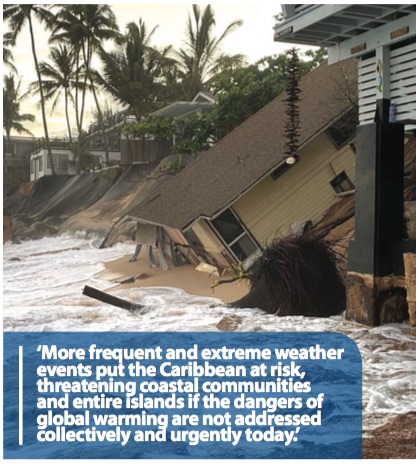Climate change is quickly becoming a defining feature of Caribbean development. Despite its importance, theoretical and practical solutions to cope with this problem have been somewhat limited, particularly in terms of socioeconomic and political dimensions. Pressures of climate change which can intensify natural disasters, and cause sea level rise, and salination of fresh water poses a great challenge.

The IMF has labelled the Caribbean region as “one of the most disaster-prone regions in the world” based on the number of disasters given their land size and populations. More frequent and extreme weather events put the Caribbean at risk, threatening coastal communities and entire islands if the dangers of global warming are not addressed collectively and urgently today.
The Conference on the Economy (COTE) 2022, now in its 16th year, being held on November 3 and 4 has as its theme "Climate Change and Disaster Management: A Movement Towards Sustainable Development for Small Island Developing States".
COTE, hosted by the Department of Economics in the Faculty of Social Sciences at The UWI St Augustine, will bring together policymakers, academics, students, and representatives from the private sector to discuss issues surrounding climate change.
Climate change affects the entire population, particularly the most vulnerable. It endangers our achievement of sustainable development and reduces success in our goal of poverty eradication. In general, the proliferation and strength of natural disasters linked to climate change means that virtually all economic sectors in the Caribbean are being impacted in multiple ways: job losses, reduced productivity, decreased tourism demand, and damage to public and private infrastructure.
It is important to consider that Caribbean economies have a small geographical area and large segments of our populations are located close to the coasts. Our economies are concentrated in productive sectors that are dependent on natural resources. Persons whose livelihoods depend on agriculture and tourism may see major negative effects as a result of climate change. Prolonged exposure to consistent disruptive events can create large-scale economic imbalances, slow economic growth, increase poverty, and create social unrest.
While we cannot prevent natural disasters, we can mitigate the consequences of global warming and extreme weather events if we address climate change and specific coastal adaptation and resilience challenges today. Working toward a comprehensive climate-change agenda entails not only ensuring the survival of Caribbean Small Island Developing States (SIDS), but also coordinating efforts to create a more secure, resilient, and prosperous hemisphere for the benefit of its citizens and future generations across borders.
More information about COTE 2022 can be found at the Department of Economics homepage at https://sta.uwi.edu/fss/economics/.